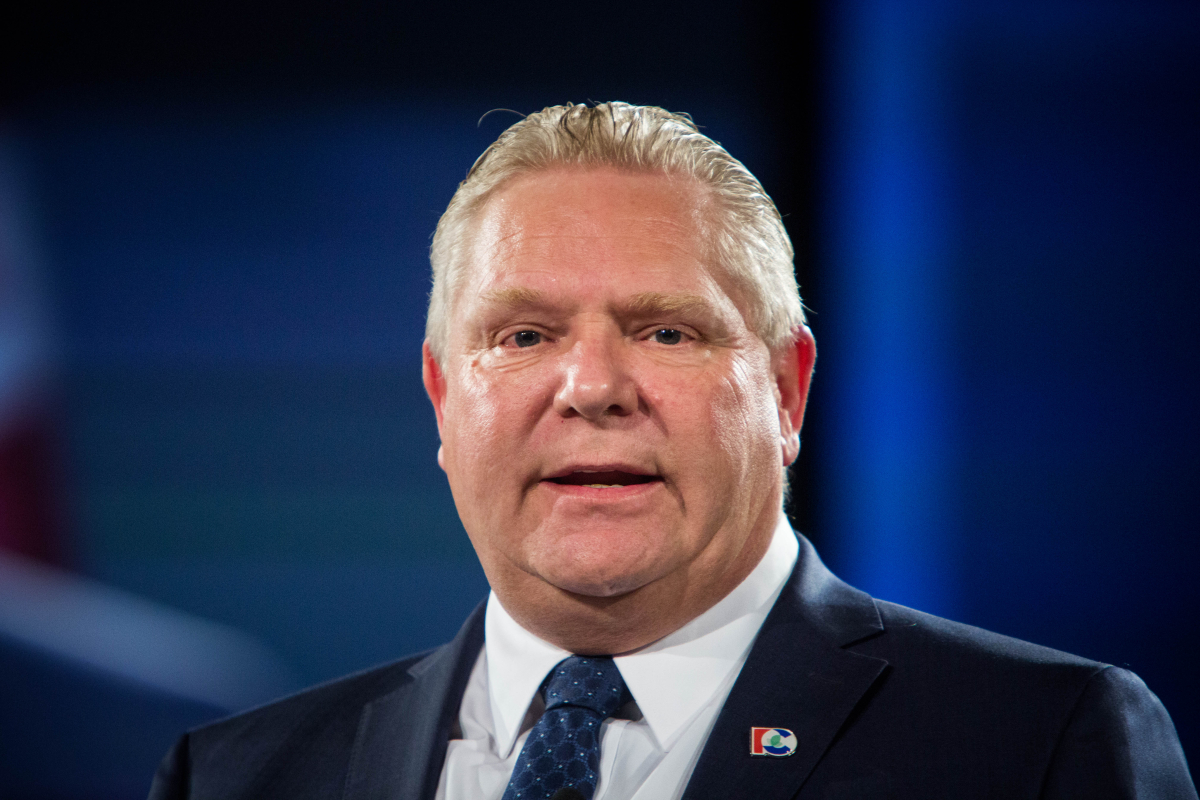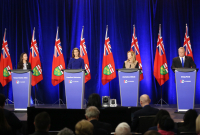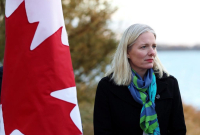Support strong Canadian climate journalism for 2025
Paul Rak is a businessman, not an environmental activist.
But when he realized eco-friendly changes could save him money, double his equipment and allow him to hire more workers at his southern Ontario metal fabrication plant, he couldn't refuse.
The cost-cutting measures also happened to slash his plant's carbon pollution.
Since 2006, Rak said he's saved $2 million and grown his workforce by 25 per cent at VeriForm Inc. in Cambridge, Ont., through dozens of adjustments to the plant's natural gas and electricity use.
He said his experience proves that stricter environmental standards don't kill jobs or growth.
“It’s a huge misnomer to say, ‘Oh, it’s going to cost jobs,’” Rak explained in an interview on March 14. “If you increase standards, you improve employment.”
Among other changes, Rak outfitted his plant with newer equipment that uses less energy and requires less maintenance, changed the plant's electricity-use patterns to avoid being dinged at higher rates, and tightened up factory floor rules to better conserve heating in the winter.
The changes have cut his greenhouse gas emissions down from 261 tonnes of carbon dioxide equivalent a year in 2006, to 60 tonnes in 2017 — a reduction of 77 per cent. With the help of purchased offsets, the plant now bills itself as carbon neutral.
It didn't take long-term investments, said Rak. Instead, “we were seeing paybacks of about three to six months on these projects."
Although his efforts were voluntary, Rak argues that Ontario should be looking to build on the environmental standards for businesses that it already has in place, because he believes doing so will create more jobs.
"When you say (for example), ‘These cars need to be more efficient,’ somebody’s got to do the engineering, we need to apply the newer technology — so it always increases jobs, and it makes us leaner with less waste," he said.
VeriForm was featured in a March 2018 report by the Smart Prosperity Leaders' Initiative, which brought together businesses, labour leaders, NGOs and others to brainstorm Canada's transition to a low-carbon economy. The report reached several conclusions, including the need to keep "world-class environmental standards” in Canada, like carbon pricing, in order to continue to attract private investment.
Voters in Ontario, Canada's most populous province, will soon face a choice about how seriously to heed their words.

Ontario's green regime under the microscope
As Ontario prepares to go to the polls on June 7, the province's environmental policies, including its carbon pricing regime and support for renewable energy programs, are being put under the microscope by its main opposition party.
Doug Ford, leader of the Progressive Conservative party, has previously called the province's Green Energy Act, which supports renewable energy, a “scam,” and said putting a price on carbon pollution — currently required under Ontario's cap and trade system — is a "job-killer."
Ford has repeatedly described Ontario's carbon pricing as a large cost to the economy, despite government figures showing it has in fact raised more than $2 billion in provincial revenue. Ford's team declined to reveal the source of his figures to National Observer.
“The carbon tax is a terrible tax. It’s a terrible tax for the people of this province. It’s a job-killer, absolute job-killer, to companies around Ontario, right across this country,” Ford said at a Feb. 28 leadership debate. “We’re trying to compete worldwide, with our hands tied behind our back.”
Meanwhile, his former leadership rival, Tanya Granic Allen, who is seeking her party's nomination to run as a candidate in Mississauga-Centre, has attacked renewable energy and questioned humanity's contribution to climate change.
"I’m going to take those wind turbines and I’m going to rip them right out of the ground," she said at the February leadership debate in Ottawa. Constituency members of the riding eyed by Granic Allen will meet on April 21 to decide whether to nominate her at the party's candidate for MPP.
When Rak hears those kinds of comments, he wonders whether the person saying them has really thought things through.
“I’ve met politicians," he said. "I’m not sure if they’re educated on these things, if they’re just trying to win voters, or if they’re really looking long-term at making us competitive."
He's not alone in his understanding of going green for profit: VeriForm was given ideas, technical support and organizational resources by regional sustainability initiatives, which boast about the dozens of firms they connect with that are happy to push green standards forward.
There are approximately 70 organizations in VeriForm's region around Waterloo, Ont. that are working on reducing their environmental footprint in business-friendly ways, said Tova Davidson, executive director of Sustainable Waterloo Region, which supported VeriForm through its Regional Sustainability Initiative.
"We are happy to support this local movement which is being scaled across Ontario," she said.
Mike Morrice, executive director of Green Economy Canada, a non-profit based in Toronto and Ottawa, said the green movement is widely supported across southern Ontario businesses, "from breweries to insurance companies to utilities."
"We’ve seen there are plenty of business leaders who are keen to respond, and in doing so, who want to stay ahead of whatever standards or regulations politicians set that raise the minimum bar for their competitors," he told National Observer.

Campbell’s Soup factory singled out
Ford’s pitch is that Ontario’s green policies are hurting business. At the February leadership debate, he pointed to Campbell Soup Company’s Jan. 24, 2018 announcement that it was closing its iconic manufacturing facility in Toronto as evidence.
“Right now, we have a company closing called Campbell’s Soup, down in Etobicoke. A hundred years — 100 years they’ve been in business,” he said. (The plant itself opened in 1931, which is 87 years ago.)
“When we had a talk to the people at Campbell’s Soup, do you know what they said? They said, ‘How can we compete, when we have the highest hydro rates in North America? Highest property taxes? Highest water rates?" Ford continued.
"And then, you try and burden us with a carbon tax? That’s unacceptable.”
National Observer asked Campbell Soup Company on March 28 if it could confirm the meeting with Ford or a member of his team that he described, whether it had ever expressed concern about Ontario utility rates and property taxes hurting competitiveness, or whether it considered carbon pricing to be a “burden.”
Nicky Thomson, the company’s senior manager of media relations, acknowledged on March 29 receiving a query from National Observer but did not respond to repeated emails and phone calls on March 29, April 2 and April 4.
The company's press release said it was keeping its Canadian headquarters and commercial operations in Toronto, moving to a new location, and moving its soup and broth production south of the border to U.S. plants. It said the plant's closure was due to "excess capacity" in its supply chain, thanks to "productivity improvements" and less canned soup being produced overall.
It's unclear how much the company has had to pay as a result of Ontario's cap and trade program — if anything.
Ontario’s emissions reporting data indicate the soup factory emitted 31,629 tonnes of climate-warming greenhouse gas emissions between 2016 and 2017. That number is greater than the 25,000-tonne cutoff point, over which Ontario mandates that a facility partake in cap and trade, meaning the soup factory would likely be in the program.
But it is also relatively low compared to the highest carbon polluters in Ontario that emit amounts in the millions of tonnes per year. Out of 270 listed facilities with emissions greater than zero, provincial data show the soup factory emitted the 116th largest amount.
More importantly, the province is currently giving away free emissions credits specifically to help businesses comply with the program while staying competitive, and “most large emitters” will receive these free allowances until 2020, The Canadian Press has reported.
Calculating exactly how many free credits the soup factory was awarded is difficult without more knowledge of the facility, because the province takes into account a wide range of factors about each individual emitter when choosing how to give out the freebies.

How VeriForm greened its operations
Rak's business of metal fabrication — cutting, bending and assembling sheet metal to create structures — is a relatively energy-intensive endeavour.
His plant has drill presses, welding machines, plate rollers, and other large, heavy equipment. The plant itself is also large, requiring lots of lighting, heating or cooling depending on circumstances.
There are different ways for metal fabricators to green their operations. Some are adopting fiber laser cutters, which use far less power than traditional lasers, while others are buying newer, more efficient welding machines.
Prior to his own climate-friendly changes, Rak's delivery trucks were keeping his plant’s bay doors open as they unloaded, letting the cold air in, so he installed a system to alert staff that the doors were open using an LED notification. This allowed them to moderate the heat in the winter.
“We used to spend $6,000 a month on natural gas, now we’re lucky if we spend $600,” he said.
Rak said he makes $4 million a year in gross sales. While he didn’t want to reveal his annual revenue, he said it has “more than doubled” since adopting the new sustainability measures.
This works out to “$70,000-plus per year” in electricity savings, “about a tenth” of what they were 12 years ago, he said. He's also saved “$30,000-plus per year” in natural gas savings and “easily $35,000+ a year” in maintenance savings, he added.
He put in place new rules around what machines are run at what time, and began monitoring their power draw. Running all the equipment at once, he said, leads to a spike in power use that will lock in the plant at that peak electricity rate over the month. He also changed the factory lighting to lower-energy bulbs.
“We get live charts that show our usage,” he said. “We’ve been able to reduce our peak, almost every year for the last five years, by around 15 per cent every year, just by monitoring it.”
As for staffing, 20 per cent of his costs over a two-week period were on secondary shifts, like weekend shifts, he said. Juggling staff schedules saved on heating and lighting expenses.
Rak said the sustainability savings allowed him to increase VeriForm’s staff, despite the 12-year cost-cutting exercise. He said he could not report staffing figures with “absolute certainty” but said his workforce is “about 25 per cent larger.”

Support from regional sustainability initiatives
Rak said his work with Sustainable Waterloo Region helped him see how other businesses, as well as the city and regional governments of Cambridge and Waterloo, run their own buildings and machinery.
“I went in skeptically saying, ‘I’ll never learn anything from these people, it sounds like hubris,’" he admitted. "But we came away learning a ton that we weren’t doing, and it pushed us forward."
Davidson of Sustainable Waterloo Region said the Regional Sustainability Initiative was "proud to have been a part of VeriForm's success."
"VeriForm was one of the first members of our program and has been a leader and inspiration from the outset," Davidson wrote in an email.
"Our support of VeriForm through this process of setting and reaching their impressive 100 per cent GHG reduction target has included not only technical supports, but also organizational resources. These have included carbon accounting software, educational forums and best practices, regular progress reporting, one-on-one coaching, and convening a network of like-minded organizations to encourage ongoing progress."
Regional Sustainability Initiative is also supported by Morrice's Green Economy Canada.
“VeriForm is a great example of what can happen when a business leader...sees sustainability not as a compliance issue, but as an opportunity to set themselves apart,” said Morrice in an email.






Comments
Doug Ford feigns knowledge of the facts. Does he have knowledge of anything?
Good luck to the morons who are going to vote for this idiot and his party.
The likes of them voted in brother Rob and Trump, creating political mayhem and discord.
Fact - Rak has demonstrated that going green is NO "scam"; he's been able to create MORE jobs, use LESS energy, and prove that Doug Ford is entirely out of his element.
Now if the likes of VeriForm Paul Rak invested in Solar panel installation on roofs or property, they’d benefit from the decreased daytime useage of electricity supply from the grid. Number crunchers can speculate the ROI by multiplying the KWhs of Solar power rated capacity installed by the current actual delivered cost per KWh being paid now to their utility supplier. Further speculation might consider projected costs from utility suppliers for the next 20 or so years, while the solar panels will have continued to perform at near zero cost/KWh. (My ground mount solar system has required an expenditure of $25.00 to buy a long handled brush to scrape off snow from the panels a couple times a year—that’s over five years!)
Rak did go about it the right way, though, which is to lower one's energy needs as much as possible and then purchase renewable energy infrastructure. (Savings through "negawatts," which the Rocky Mountain Institute's Amory Lovins explains as "energy that you have not used through energy conservation or the use of energy-efficient products." That way, the move to renewable energy is a lot less "painful" in terms of start-out costs.
Rak did go about it the right way, though, which is to lower one's energy needs as much as possible and then purchase renewable energy infrastructure. (Savings through "negawatts," which the Rocky Mountain Institute's Amory Lovins explains as "energy that you have not used through energy conservation or the use of energy-efficient products."